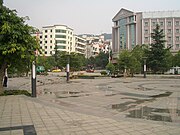Town (China)
| Town (Zhen) | |||||||||||
|---|---|---|---|---|---|---|---|---|---|---|---|
| Chinese name | |||||||||||
| Simplified Chinese | 镇 | ||||||||||
| Traditional Chinese | 鎮 | ||||||||||
| |||||||||||
| Tibetan name | |||||||||||
| Tibetan | གྲོང་རྡལ། | ||||||||||
| |||||||||||
| Zhuang name | |||||||||||
| Zhuang | Cin | ||||||||||
| Korean name | |||||||||||
| Hangul | 진 | ||||||||||
| |||||||||||
| Mongolian name | |||||||||||
| Mongolian Cyrillic | балгас | ||||||||||
| Mongolian script | ᠪᠠᠯᠭᠠᠰᠤ | ||||||||||
| |||||||||||
| Uyghur name | |||||||||||
| Uyghur | بازارلىق | ||||||||||
| |||||||||||
| Manchu name | |||||||||||
| Manchu script | ᡴᠠᡩᠠᠯᠠᠩᡤᠠ | ||||||||||
| Möllendorff | kadalaŋga | ||||||||||
| Kazakh name | |||||||||||
| Kazakh | قالاشىق қалашық qalaşyq | ||||||||||
| Kyrgyz name | |||||||||||
| Kyrgyz | شاارچا шаарча şaarça | ||||||||||
| Administrative divisions of China |
|---|
|
History: before 1912, 1912–49, 1949–present Administrative division codes |
When referring to political divisions of China, town is the standard English translation of the Chinese 镇 (traditional: 鎮; pinyin: zhèn; Wade–Giles: chen4). The Constitution of the People's Republic of China classifies towns as third-level administrative units, along with, for example, townships (Chinese: 乡; pinyin: xiāng).[1] A township is typically smaller in population and more remote than a town.
Similarly to a higher-level administrative units, the borders of a town would typically include an urban core (a small town with the population on the order of 10,000 people), as well as rural area with some villages (村; cūn, or 庄; zhuāng).
Map representation
A typical provincial map would merely show a town as a circle centered at its urban area and labeled with its name, while a more detailed one (e.g., a map of a single county-level division) would also show the borders dividing the county or county-level city into towns (镇) and/or township (乡) and subdistrict (街道) units.
The town in which the county level government, and usually the division's main urban area), are located is often not marked on less-detailed maps, because its location is usually labeled with the name of the county level division rather than the name of the actual town into which this urban area falls. For example, the county government of Tongshan County is located in Tongyang Town (通羊镇; Tōngyáng zhèn),[2] but the maps would normally show it with a circle labeled "Tongshan County" (通山县) or simply "Tongshan" (通山). Road signs would also normally show distance to "Tongshan" rather than "Tongyang".
On the other hand, more detailed maps - e.g., maps of individual prefecture-level cities in a provincial atlas - would label the county seat location with both the name of the county (e.g., 通山县; Tōngshān xiàn) and, below, and in a smaller font, with the name of the township (e.g., 通羊镇; Tōngyáng zhèn).[3]
Intercity buses, trains, or riverboats destined to, or stopping at a county seat may designate its destination either by the name of the county or the name of the county-seat township.
Usage of zhen in Taiwan
In contrast to the PRC, in the official translation adopted in the ROC, both the characters "鄉" (pinyin: xiāng) and "鎮" (zhèn) are translated as "townships", with zhèn specifically being "urban" township, 'with xiāng specifically translated as "rural" township
Gallery
- In the central urban area of Longgang Town (龙港镇; Lónggǎng Zhèn), a typical town of Yangxin County, Hubei
- Maoping Town, the county seat of Zigui County, is often labeled "Zigui" on less-detailed maps
References
- ^ "Administrative Division". english.gov.cn. Retrieved 2018-03-30.
- ^ Google Maps: [1]. To get to Tongshan, Hubei, one can first search Google Maps for "Xianning", and then scroll south and south-east along S208 and S209
- ^ Compare e.g. the provincial map and individual prefectures' maps in the Road Atlas of Hubei (湖北省公路里程地图册; published by SinoMaps Press, 2007, ISBN 978-7-5031-4380-9), or in any other comparable atlas.


